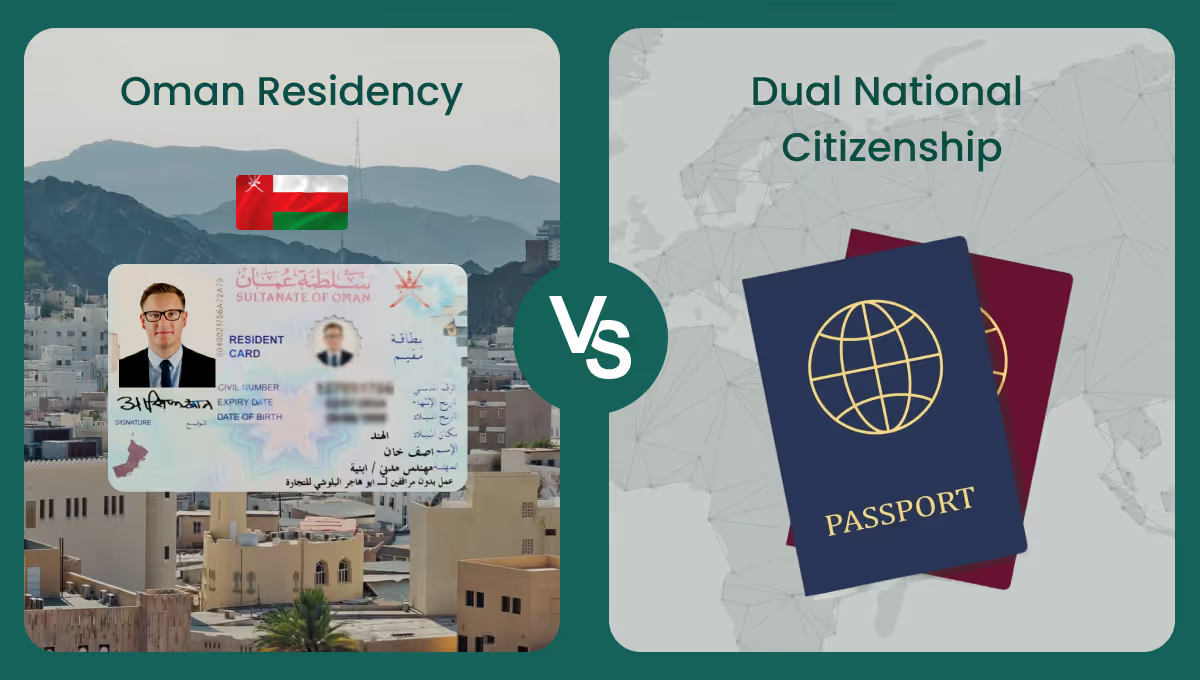
Oman is currently considered one of the most attractive countries for investors in the Gulf. What attracts businessmen the most is its simple tax system, competitive rates, and strong government support for business growth. The country offers low corporate taxes, no personal income tax until 2028, and tax-free incentives in free zones.
In this guide, we’ll cover Oman taxation for companies and individuals, explore corporate tax rules, VAT, future personal income tax, free-zone benefits, and double-tax agreements.
Key Takeaways
- Oman taxation is considered one of the most favorable in the GCC for investors. The country has a 15% corporate tax and 0% personal income tax (until 2028).
- Oman's new personal income tax law starts in 2028 and applies only to individuals who earn more than OMR 42,000 per year.
- Oman has a 5% VAT. There are some exemptions and zero-rated categories for essential sectors and exports.
Overview of the Oman Tax System
The Oman taxation system is very young. The primary tax on businesses is the corporate income tax. The revenue is supplemented by VAT, customs duties, and royalties. The system integrated the permanent establishment (PE) principle. This means that foreign companies pay taxes only if they have a fixed place of business or provide services in Oman for at least 90 days in a 12‑month period. Tax administration is overseen by the Oman Tax Authority (OTA), which has moved most of the processes to an online portal.
The key features of Oman’s tax environment include:
- Moderate corporate tax rate, with a standard of 15% for most businesses. If small companies meet specific capital, revenue, and employment thresholds, they can pay a reduced 3%. Oil and gas companies pay a much higher rate, which is 55%.
- Oman doesn’t have personal income taxes for individuals. However, since 2028, high-income individuals will need to pay a 5% personal income tax in Oman.
- VAT in Oman is 5% and applies to most goods and services. However, there are zero‑rated and exempt supplies. Businesses that have at least OMR 38,500 taxable turnover must register. Additionally, businesses that have at least OMR 19,250 turnover can voluntarily register.
- Payments to non‑residents for royalties, technical services, and management fees are subject to 10 % withholding tax. Dividend and interest payments are generally exempt from withholding.
Compared to other GCC countries, Oman taxation is one of the most favorable options for investors. Here are some details about other countries:
- Saudi Arabia applies a 20 % corporate income tax on non‑GCC investors and a 2.5 % zakat on Saudi and GCC nationals.
- Qatar has a 10% corporate tax rate.
- Kuwait has a 15% income tax rate for foreign shareholders.
- The UAE has a 9 % corporate tax for those whose profit is above AED 375,000.
- All the other GCC countries have a 5 % VAT, but Oman is the first to announce a personal income tax that will be effective since 2028.
- Bahrain and the UAE still don’t have a broad personal income tax for residents.
Corporate Tax Landscape
Rates and Basis of Taxation
Currently, both Omani entities and foreign company branches need to pay 15% of their taxable profits. Small companies that have no more than OMR 50,000 capital, a maximum OMR 100,000 annual revenue, and up to 15 employees, may apply for the 3% corporate tax rate. On the other hand, petroleum companies pay 55%.
Resident entities are paying taxes for their worldwide income, while non-residents are only taxed for their income that’s generated in Oman.
The basis period is normally the calendar year, but taxpayers can apply for a different 12-month period. Entities must file an annual tax return and pay tax within four months after their financial year‑end. Late payments cause paying additional interest of 1% per month and up to OMR 2,000 in penalties.
Special Regimes for Small Businesses and Multinationals
Small Omani proprietorships and LLCs that meet the criteria about the capital, turnover, and employee number can apply for the 3% tax rate. There are even specific requirements; small taxpayers may even qualify for a 0 % rate if at least 2 full-time partners are Omani nationals.
Since January 2025, Oman has implemented a domestic top‑up tax system aligned with the OECD Pillar Two rules. Those multinational groups that meet specific criteria need to pay an effective tax rate of at least 15 %.
Filing and Payment Obligations
Taxpayers need to register with the Oman Tax Authority and keep their financial statements aligned with International Financial Reporting Standards (IFRS). Companies must submit a single “Return of Income” during the first four months after the year‑end and pay any tax due at the same time. Small enterprises that want to be taxed at 3% or 0% need to submit the file during the first 3 months. If you have under‑reported income or don’t follow the compliance, you will get a penalty from 1 % to 25 % of the tax difference, and the OTA can confiscate assets.
Withholding Taxes (WHT)
Withholding tax in Oman is applied on certain payments to non‑residents who do not have a permanent establishment in the country. The WHT rate is 10 % for royalties, fees for research and development, fees for use of software, and management or technical services․
Incentives for Industrial Projects
Oman offers tax exemptions for certain industrial activities. For example, those companies that are performing activities in manufacturing may receive a five‑year income tax exemption.
Personal Taxation for Foreign Investors and Residents
For decades, there was no personal taxation in Oman. But this doesn’t mean that employees don’t contribute to social security. Omani private‑sector workers contribute 6.5 % of their salary, and employers contribute 9.5 % plus 1 % for industrial injury insurance.
On 22 June 2025, Royal Decree 56/2025 announced Oman’s first Personal Income Tax Law. The decree was published on 30 June, and the law will be in force starting from 1 January 2028. According to the new law, those individuals whose gross income is more than OMR 42,000 (about USD 109,000) will pay a 5% income tax. Here are some key features of the personal income tax:
- Tax residents are those individuals who stay in Oman for at least 183 days in a tax year․. Residents will be taxed on their worldwide income, while non-residents will be taxed only on the income that’s been generated in Oman.
- Gross income includes salaries, allowances, and other receipts. Incomes like foreign salary or inheritance are exempted.
- Permitted deductions include education expenses, medical expenses, charitable donations (zakat), and housing expenses.
- Employers must withhold the tax from salaries and remit it to the OTA.
VAT and Indirect Taxes
Oman introduced value-added taxes on 16 April 2021 under Royal Decree 121/2020. The standard VAT is 5% and applies to almost all goods and services. Oman Tax Authority administers VAT with an online platform. Returns are usually filled quarterly.
Here are some points that you need to consider:
- Businesses with annual supplies that are higher than OMR 38,500 must register for VAT. Those that have at least OMR 19,250 turnover can voluntarily register.
- Exports of goods and services, basic food items, medicines and medical equipment, investment gold/silver/platinum, international transport and supplies within special economic zones are zero‑rated․. Businesses can claim input VAT credits on zero‑rated supplies.
- Financial services, healthcare, education, undeveloped land, resale of residential property, local passenger transport, and residential rentals are VAT‑exempt. Businesses with exempt supplies can’t reclaim input VAT.
- Taxpayers have to submit VAT returns with the OTA portal. In the portal, they need to fill in information about output VAT collected and input VAT paid, and settle any net VAT due within 30 days of the period end.
In 2025, Oman expanded the scope of VAT for foreign digital services and reinforced the reverse charge mechanism (RCM). Those businesses that import services are required to account for VAT themselves.
The OTA is also preparing for the e-invoicing implementation starting from 2026.
As for the additional taxes:
- Oman also imposes excise tax for specific goods like tobacco products, energy drinks, and sugary beverages.
- Transferring real estate requires paying a 3% stamp duty.
- Customs duties generally apply at 5 % on imported goods.
- Oman doesn’t have any inheritance, wealth, gift, or net worth tax.
Tax Incentives and Investment-Friendly Policies
Oman aims to attract foreign investment. Therefore, the country has established several free zones and special economic zones (SEZs) with several benefits for investors.
Duqm Special Economic Zone is managed by the Public Authority for Special Economic Zones and Free Zones (OPAZ) and offers 100 % foreign ownership, long‑term land leases, and tax exemptions. In April 2025, Oman introduced a new Special Economic Zones and Free Zones Law, which grants qualifying enterprises a 10‑year income tax exemption. The period can be extended for two additional periods for activities of a special nature.
Sohar, Salalah, and Al‑Mazunah Free Zones allow investors to operate with 0 % corporate tax for up to 10 years, duty‑free import and export, and full repatriation of profits.
Double Taxation Agreements (DTAs)
Oman has signed several DTAs to prevent double taxation. U.S. Investment Climate states that Oman concluded 29 bilateral investment treaties and 39 double taxation treaties. Oman’s DTAs are signed with countries like the United Kingdom, India, France, Singapore, Italy, Germany, South Korea, Mauritius, Egypt, China, Pakistan, the UAE, and Switzerland.
DTAs have several advantages, such as:
- Lower withholding taxes on dividends, interest, and royalties improve cash flow.
- Resident investors can claim foreign tax credits or exemptions in their hometown, preventing double taxation.
- DTAs make the tax system more transparent.
Tax Residency in Oman
The person is considered a tax resident if he/she resides in Oman for at least 183 days in a tax year. Tax residents are taxed for their worldwide income that’s more than OMR 42,000. Non-residents need to pay taxes in Oman only if the income was generated there.
A company is considered a resident in Oman if it is incorporated or registered in the Sultanate. Foreign companies are taxed in Oman if they have a permanent establishment or have activities in consultancy or other services for 90 days or more within a 12‑month period.
As in 2025, there have been many changes. If you’re interested in establishing or proving tax residency, you’ll need to consult with an expert to get everything right and get a personalized approach. You can contact Mirabello Consultancy and get a free consultation.
Oman vs Other Gulf Tax Systems
GCC tax systems are very different from each other. Oman is considered one of the most investor-friendly countries.
Corporate income tax in Oman is 15%, which can be reduced to 3% rate for small taxpayers, and increased to 55% for petroleum companies. Oman currently has no personal income tax, but since 2028, those individuals who have more than OMR 42,000 annual income will need to pay a 5% income tax. VAT is also 5%, but investors can benefit from 10-year tax exemptions in free zones and SEZs.
In comparison, the UAE introduced a 9% corporate tax in 2023 with no personal income tax and a 5% VAT. However, qualifying free-zone companies can apply for the 0% corporate tax. Saudi Arabia has a 20% corporate tax on non-GCC investors and a 2.5% zakat on Saudi/GCC nationals' businesses, and 5% VAT and special-zone tax incentives. Qatar offers a 10% corporate tax on foreign firms, applies no personal income tax, and also charges 5% VAT, offering long-term tax holidays in its free zones. Bahrain has no general corporate tax except in the oil sector, no personal income tax, and a 10% VAT. Kuwait applies a 15% corporate tax only to foreign entities, with local companies instead paying 2.5% zakat/khandaa. Kuwait currently has no VAT, but 5% VAT is planned.
Conclusion
Oman offers an investor-friendly tax environment with low rates and attractive incentives. With 15% corporate tax, no personal income tax until 2028, and benefits in free zones, the country became an attractive choice for foreign businesses and investors.
As Oman introduces new tax measures and adjusts its system to international standards, investors should stay updated. For personalized guidance on tax planning and investment setup in Oman, contact experts like Mirabello Consultancy and make your path easier.
FAQ
Currently, Oman doesn’t have any personal income taxes on individuals or expats. However, Royal Decree 56/2025 introduces a 5 % personal income tax on annual gross income exceeding OMR 42,000 (approximately USD 109,000) effective 1 January 2028.
Yes. Value Added Tax in Oman was implemented on 16 April 2021. It has a standard 5% rate for most goods and services. There are even supplies like exports, basic food, and medicines that are zero-rated, or financial services, education, healthcare, and residential rents that are exempt.
Businesses that have a taxable turnover over OMR 38,500 need to register.
Yes. The personal income tax law has already been enacted. The Personal Income Tax Law (Royal Decree 56/2025) was published on 22 June 2025 and will become effective on 1 January 2028. According to the law, individuals with high incomes must pay a 5% tax. While the law isn’t effective right now, investors and entrepreneurs need to start preparing for the new system.





